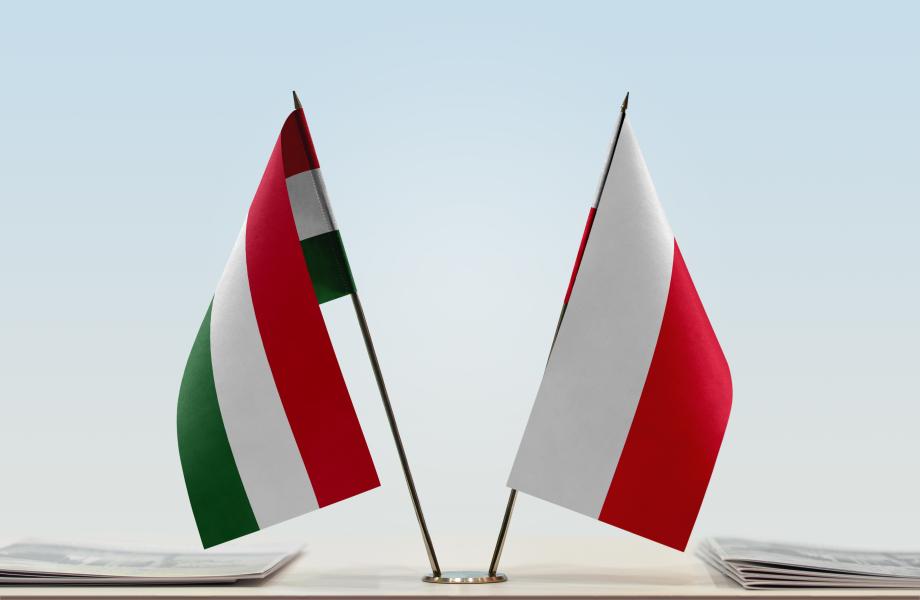The Incomplete Divorce: Hungary and Poland's tumultuous relationship may not be as 'over' as everybody thought

As the war in Ukraine rages on, the future of the Polish-Hungarian relationship hangs in the balance. Where the two were once in lock-step, their diverging views on Russian aggression have created a rift. The future for both countries is uncertain, especially in light of the ongoing Article 7 TEU proceedings, the withholding of EU funds for the rule of law-related concerns, and the upcoming Polish elections. While Poland and Hungary's irreconcilable positions on Russia may have soured what was once a close friendship, the two countries will be forced to cooperate, particularly on issues of rule of law and migration.
Before the war, Poland and Hungary were two peas in a pod, jointly undermining the EU's core democratic values. But things seemed to change after Russia launched its brutal attack on Ukraine. Fearing an expansionist Russia, Poland became one of Ukraine's staunchest defenders, taking in over 1.5 million refugees – the most out of any EU member state. Orbán, in contrast, prefers ideological alignment with Russia, questioning Ukraine's sovereignty, openly courting Putin, and blocking aid packages. As a result of these diverging views, both Orbán and Morawiecki said that the Polish-Hungarian friendship was over. Diplomatic relations turned frosty amidst cancelled ministerial meetings and visits, as well as tensions between Presidents and ambassadors. Even cooperation within the V4 has been put on hold, with the Czech government pivoting back towards the EU. Indeed, many predicted that this crisis would be the final straw to break up Central Europe's 'illiberal alliance'.
And yet, while Orbán and Morawiecki may not be on the friendliest terms, junior ministers seem more vocal about upholding the Polish-Hungarian friendship. Both the Polish Minister of Education and Science and the Deputy Minister of Agriculture and Rural Development have emphasised the importance of the shared values and history between the two countries. While in Hungary, the Secretary of State for Church and National Relations highlighted the need for cooperation in defending Christianity. Moreover, Hungary's President, Justice Minister, and the Secretary of State for International Relations celebrated the day of Hungarian-Polish friendship on March 23, 2023. In addition, it seems that the two countries will still need each other's support in Brussels, especially regarding their aligning views on the rule of law and migration. The latter is an area of explicit cooperation, while the former is maybe more implicit or tacit.
Regarding the rule of law, both Hungary and Poland have long been a thorn on the side of the EU. Brussels continues to raise concerns about corruption, media freedom, and the independence of the judiciary in both countries, as evidenced in the most recent rule of law report. Given the lack of substantive reforms and the application of the conditionality mechanism, future funding will likely continue to be withheld from both countries. At the same time, the Article 7 TEU proceedings initiated by the Commission and the European Parliament are likely to continue. In this context, Poland and Hungary will be forced to continue their implicit cooperation because both realise that they have to protect one another with their veto power, thereby stalling the proceedings. If one of the two were to have their voting rights suspended, then the other would be left without a supporter. This means that on the rule of law, Hungary and Poland are stuck together, whether they like it or not.
Another major area in which Poland and Hungary are continuing their cooperation is opposing the EU's migration reforms. Most recently, during the European Council meeting at the end of June, both Hungary and Poland opposed the EU's migration pact. Despite hosting many Ukrainian migrants, and potentially profiting from the new migration pact, Poland's ruling PiS party opposes the plan to satisfy its anti-migrant base. This puts it on the same page as Hungary, where extremely anti-migrant policies have shaped Orbán's reign. Given that this migration reform package was adopted by a qualified majority, neither country was ultimately able to veto the decision, though that did not stop them from making their displeasure known at the Council meeting. Of course, an EU decision does not mean that either country will implement the reforms. Morawiecki plans to hold a referendum on the migration deal, while Orbán simply refused to accept the EU's decision. The two countries can also draw on a precedent, namely their refusal to implement the 2015 Migrant Distribution Mechanism, something for which neither country was sanctioned. Poland and Hungary will likely have to continue their cooperation on the issue of migration, aligning both to satisfy their anti-migrant constituencies and to shield each other from future EU repercussions over their refusal to follow the new rules.
All in all, one cannot underestimate the impact that Hungary's brazen and full-throated support of Russia has had on its relationship with Poland. That being said, commentators who predicted the end of the Polish-Hungarian alignment within the EU may have been too hasty. As long as PiS and Fidesz remain in power, the two countries will have to be unified vis-à-vis the EU, especially on the rule of law and migration issues. Even if the relationship has cooled off, they must support one another to prevent the EU from further sanctioning them. Of course, the situation may change by the end of the year when Poland holds elections. While polling shows that PiS is still in the lead, if it cannot secure a victory, the relationship may truly change. A Polish government not led by PiS could implement the EU's proposed reforms and break from Hungary fully. If PiS does win the elections, then Hungary and Poland will be stuck in their marriage of convenience for the foreseeable future, even as their divergent views on Russia and Ukraine remain a sore topic, hindering the creation of a unified, pan-European far-right.
* Funded by the European Union. Views and opinions expressed are however those of the author(s) only and do not necessarily reflect those of the European Union or EACEA. Neither the European Union nor the granting authority can be held responsible for them.


Intern, GLOBSEC Brussels